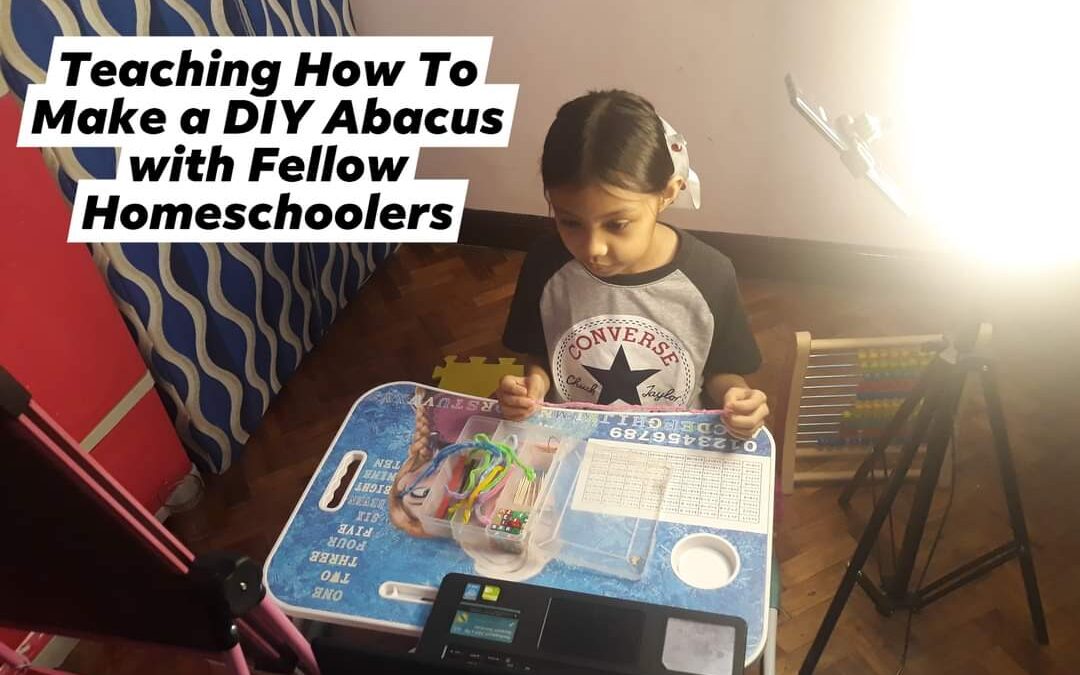It feels so rewarding when your homeschooled children want to be a teacher someday. It means that they enjoy their learning experience and also want to share their knowledge and experiences with other children someday. So, my husband and I allow our children to play the role of being a teacher from time to time.
Recently, my daughter asked me if she can teach her fellow homeschoolers in our Family Learn Group. One of the topics that she thought of was Abacus. We’ve been using Abacus for years as a manipulative in our Math subjects and it’s really amazing. So, we supported her plan in teaching Abacus.
It is common in our learn group that parents facilitate activities and lessons to other families. But why did I allow my daughter to facilitate the session from start to end? It’s because I am training her to become a good facilitator. She may be teaching lessons that she already learned in the past but thinking about the soft skills that she’ll gain from this experience made me support her plan because it is priceless.
Here are some benefits of role-playing as a teacher:
1) The child gets to experience how it’s like to become a teacher. She understands that it is not easy to become a teacher:
- You must be confident enough to speak and do things in front of the students.
- You must be friendly and approachable so that your students will feel comfortable during the session.
- You must be attentive to your students’ concerns at the same time. Students have different needs and concerns that may pop up anytime.
- You must consider that not all students can catch up at the same time so you have to be flexible and considerate.
- You must be sensitive to the students’ progress and must always check on them if you are all on the same page by asking them if they understand what you are trying to say or if they have a question.
- You must give feedback to your students for them to know if they’re doing things correctly or not, and make sure to say something good about the students’ output or performance.
- You must be prepared before conducting a class. Making a program flow and script saves your day when you forget something in the middle of the session’s activity.
2) When people experience a certain situation from a perspective of another person, they will have a better outlook in life and they will become better persons. When children play the role of being a teacher, they did not only have fun in sharing their knowledge to other people but they also earn the respect for teachers. They will become better persons and perform better in school.
Some things to remember for children planning to teach other children:
- Have a good sleep the night before your class. It is nice to be well-rested before a big day.
- Rest your mind and body a few hours before your class. Of course, you can still do some activities prior to your class but make sure you don’t get tired and save some energy before the class.
- You must write your program flow and script (or key notes) properly and your notes must be organized, so that it will be easy for you to glance quickly in case you forget something in the middle of the session.
- Practice by yourself before the session. If you think you’re doing good already, practice some more to make sure you’ll do really good in the actual performance. When you know in your heart what you are doing, things will come naturally when you speak in front of other people.
- Practice with another person if you believe you are ready. It is good to hear feedback before the actual performance so that you will know what to improve in yourself.
- Prepare all the things you need the day or a few hours before your class. The list includes the clothes you will wear, the materials you need for your presentation, and setting up your devices.
- Be online earlier than the time scheduled for your class. This will give you more time to check your internet connection, your devices and computer setup.
- The beginning part of the session is the hardest but once you get through it, things will get better. The nervousness will fade over time and being prepared really helps a lot to keep going until the end of the session.
- You must be prepared to make mistakes, be open for feedback, and make sure to take note of them, so you can address them and do better in the future.
- When you are giving instructions, make sure to give all the details, step by step. Not all students can easily understand and catch up especially if your audience have different ages.
- If you are teaching about how to do something, you must have a ready and finished output so that your students can imagine how your final output should look like. But while you have a model output, you must still do everything from scratch during the session so that your students can perform the steps while you show them how to do things properly.
- Smile, always! It makes you look friendly and approachable even if you feel nervous.
- Enjoy what you are doing. If you are bored with what you’re doing, perhaps your students will get bored too. But if you enjoy what you are doing, your students will get that too. Always remember, learning is fun!
Podcast: Play in new window | Download

